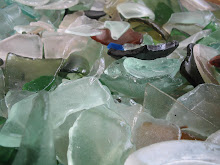Here’s a much blogged-about article from the Times on New Year’s Day, which I imagine everyone’s read by now. (If you haven't, you should!) I'd intended to link to it on the day it appeared, but what with leaking water tanks and dripping ceilings and still feeling quite sofa-ish, I didn’t bother and now it’s very old news, but it raises so many pertinent points that I feel it's worth revisiting.
I have tidied books – and even dusted them! - before selling a house, but I have never ‘got rid of them’ before putting up the For Sale sign. My house, too, is stuffed with books, yet each of the three homes I’ve sold has been snapped up within a week of going on the market, so the books can’t have been quite so off-putting as the estate agents and makeover artists claim. (On the other hand, they were Victorian/Regency 'properties', rather than shiny new Executive Homes, so maybe a bit of homely clutter was what people were expecting . . . ?)
Valerie Grove touches on many issues close to the heart of bookish types in the course of her delightfully rambly piece. Having listened to a Radio 4 dramatisation of 84 Charing Cross Road over Christmas, Helene Hanff’s stringent views on the matter of keeping books after they’ve been read (or indeed if there is little prospect of their being read) had already sprung to mind before I’d reached that part of Grove's article.
I’d always found it rather shocking that Hanff, the author of the original booklover’s book, should have taken so cavalier an attitude to books as ‘objects’, worthy of love and respect for their appearance, tactile qualities, smell, associations and meaning, quite apart from their content. Surely a book is (or can be) far more than the sum of the words on its pages? We don’t (or shouldn't) keep them to show we’re ‘well educated, right?’ – sometimes we keep them simply because they bear the handwriting (or even merely the unseen fingerprints) of a lost or departed grandparent, parent, lover, brother, sister, friend. More public than a letter, more likely to survive and to be passed down the generations or even cherished by a stranger.
Here’s a test: if you had to arrange your books in the order in which, if pressed (hard), you would be prepared to see them burned to a cinder, how would you line them all up? And why?
I know how I'd answer, and it’s entirely to do with the meaning, to me, of the books as artefacts. It’s little or nothing to do with their printed content. I would willingly offer up some of my favourite and most beloved novels to the flames – the Ian McEwans, the Carol Shields, the Salman Rushdies and Anthony Burgesses, the William Trevors, Anthony Powells, Alan Bennetts, Antonia Whites, Rosamund Lehmans; all the ‘classics’ - the Brontes, Jane Austen, George Eliot, Katherine Mansfield, James Joyce, D H Lawrence, Dickens, Virginia Woolf, Tolstoy, Shakespeare, Chaucer – whooosh! Up in smoke you go! Why? Because they could be replaced. Any time, anywhere, at large or small cost, depending on edition.
 What would be last on the list? Why, of course, six novels by Ethel M. Dell (never read – too awful!), but passionately annotated by my grandmother and bearing her youthful signature on the flyleaves;
What would be last on the list? Why, of course, six novels by Ethel M. Dell (never read – too awful!), but passionately annotated by my grandmother and bearing her youthful signature on the flyleaves;

Zen and the Art of Motorcycle Maintenance – annotated by late-teenage me throughout and inscribed as a Christmas gift from someone I thought I would one day marry (but didn’t, thank goodness!); Pilgrim’s Progress, owned by my beloved godmother and great aunt Elsie; two letterpress volumes of the Gospels, with illustrations by Eric Gill; my nearly complete set of Thames & Hudson World of Art volumes – some dating back to University days, the rest a reminder of my years at T&H;

my set of Penguin 60s – to which I am still adding (how I wish I’d splashed out on the complete collection at the time); Now We are Six and When We Were Very Young – hardback editions from the 1960s, inscribed by my parents, given on my 6th birthday and subsequent Christmas, the poems memorised by me, aged 6 and 7 long after I should have been asleep; school prizes – both my own and those of my forebears (the former a reminder that my schooldays, while not always idyllic, were not entirely in vain, and including Enid Blyton’s Five Go Off in a Caravan, which I won, aged 7, for ‘progress’[!] and read seven times over - my first 'long novel' and almost unbearably thrilling);

my mother's Gladys Peto's Bedtime Stories from the 1930s, with fabulously quirky art deco illustrations (I can feel another post coming on here) which I used to read when ill (as I was quite often, with ear infections) in bed;

little kid-bound volumes of poetry (Longfellow, Wordsworth, Byron) given by my grandfather to my grandmother before they were married (and it was, as so often in those days, and with the Great War to be survived in the interim, a long betrothal);

the Ladybird and Observer's Books of plants, trees, pond life, insects (and spiders), seashore, rocks and minerals, etc etc, which I read by torchlight under the blankets in bed aged 8 to 10 and which were patched with now yellowing sellotape against the ravages of frequent use;

various ancient tomes from the seventeenth and eighteenth centuries, most in Latin, never read, but acquired for the sheer perfect beauty of their letterpress printing, their divine rag paper and their intoxicating smell of ages past;
my collection of original Virago paperback reprints of women writers’ fiction, published in the early 1980s – lots of people scour eBay for these now but I have a huge collection because I worked in a bookshop when they were first published and scooped them up with my staff discount – they were seminal to my literary and feminist awakening!
And so it goes on. This list is off the top of my head, at the end of a long working day - I'm sure a more considered and leisurely assessment would bring others, screaming 'save me!', to the fore.
But the obvious conclusion is that the books to which I am most passionately attached are those which, as objects, hold some personal meaning far exceeding their printed content. They quiver with the history of Me.
Which means that the whole enterprise of keeping books is one of personal vanity!! Arrghh! So maybe it’s not a Good Thing at all. Perhaps it would start me off on the road to redemption if I were to start a big bonfire right now?
Help! What should I do? What would YOU do?
Please advise soonest.






















6 comments:
No Juliet, the road to redemption does not start with a bonfire of books. (We all know where that leads . . . ) And, although George Orwell said that we should 'kill our darlings', he was talking about words, and the overuse of, not books. So you can hang on to your books.
I have no useful solutions; for every one book that goes out of this house via Greenmetropolis, the local hospice shop, or to family and friends, at least half a dozen march in. Two more arrived by post this morning. I fear there is no hope.
But if flames there must be, I'd be clinging to a 19th century book of recipes (for a range, so works a treat with the Aga); my grandmother won this as a school prize for cookery in 1889, when she was 10.
And in the other hand would be my precious first edition of Hardy's Jude the Obscure, because of all that it represents to me. And for the irony. My father bought it for me when I was 15; just two years later he announced, in no uncertain terms that I could give up any fancy notions of trying for Oxford - or for any university come to that - as he had no intention of supporting me. It was time for me to get out to work and bring some money in. He was a man with whom it was unwise to argue.
So, I didn't go to university at 18 but, at 40, I graduated in English Literature and Art History, having completed a part-time degree while juggling family life, a crumbling marriage and a full-time career. It would have been 'yah boo sucks to you, Papa' if he had not already gone to meet his Maker. (If only I could have been a fly on the wall for that confrontation.) And Jude the Obscure has always been the one book that, in a house where 'books rule OK', I can lay my hands on immediately'.
None of this helps you to deal with your own book invasions, of course, but it was a thought-provoking question! Thank you for the diversion on an otherwise grey, miserable Saturday afternoon.
An utterly fascinating post, Juliet.
My instinct is never to get rid of any books, but that's just me being materialistic. And, given that even the loft conversion built to accommodate my books is now full up, unrealistic.
To make matters worse, many of the books I possess, I've never read. Should one dump those that have been read before and focus on the to-be-read pile? I'm not convinced.
I've gradually come to the conclusion that there is a hierarchy of books.
First, those with strong personal connections, to be guarded with one's life. (The snag is, I have rather a lot of those, but I do love them dearly.) It may be 'the history of me', but I don't think that's the same as vanity. And even if it is, I don't care. The books stay.
Second, the really good books that have been read (but deserve to ber read again 'when I have a bit more time') or are close to the top of the reading list.
Third,the books that have some interest, but aren't crucial. To be kept, unless space makes it impossible.
Fourth, the rest. These are the only ones that it doesn't hurt to dispose of. At least, not so much...
Two final comments. First, bizarrely, I was once given that exact same edition of the Observer's Book of Pond Life as a present. 'All aspects described' is a great phrase for such a subject, though I don't think members of the legal profession got a mention. But the book did go, some years back.
Second, did you know that Miles Franklin once wrote a crime novel? It was reprinted a decade or more ago. I managed about 20 pages and then gave up, I'm afraid. That one I have kept, but for curiosity value only.
D - Sorry, the flames/books combination has unfortunate connotations, of course. It was meant to be provocative - not politically so, but in terms of being absolutely *forced* to make a choice. The story of Jude and you is terribly poignant but also inspiring - a worthy subject for one of your own autobiographical posts one day, perhaps? I lugged four large bags of books to a charity shop just before Christmas and felt enormously virtuous, but the net result has been like baling out the cliched sinking ship with the proverbial teaspoon.
Martin - good to know I'm not alone in all this (of course I knew I wasn't but it feels good to squeeze confessions out of other people!). My Pond Life book is still in frequent use, so I can justify its space on the shelf on more than sentimental grounds. I fell in love with the film of My Brilliant Career when it came out, and enjoyed the book and its sequel but a couple of others I acquired subsequently were quite unreadable and I think they 'went' some years ago - this was one of them, if it's the country house 'comedy' one you are referring to? A hazard of discovering a writer through their best work and then moving on to their 'minor' works . . . it usually ends badly for all concerned.
We went through the agony of booksorting when we moved from a huge Edwardian house in Hampshire to a small cottage in Devon. We applied the same sort of criteria you have suggested, even so we made some many mistakes, getting rid of shelves of Penguins from the 60s and 70s, dozens of books from student days among them. I have noticed that both my husband and I scour the second hand bookshops to replace those old lost loves!
I could never part with my set of Kingston Library books, published by the Thames Publishing company in the 1950s. We had all of the Biggles books in that series and gripping yarns for girls such as 'Deborah's Secret Quest' and 'The Little Countess.' All the girls were called Lavender, Annabella or Fish and said things 'stoutly'.
I think nostalgia and sentimental attachment would always come first. I would leave the first editions and signed copies to the flames and save the books with special memories and associations.
Juliet, thanks for your comments on my journal. To be truthful I read this post and used the links to the article and found myself deep in thought about why I find it difficult to let go of books. Now, even sadder to admit, I find it difficult to let go of glossy magazines too.
Let me first say, that like 60goingon16, I studied for my degree in Art & Design in my forties whilst juggling the needs of a young family and think that it has a bearing on my need for the visual. Hence the not being able to give up the glossies. I think the (still limited) knowledge of design and photography I enjoy means I find the pages too wonderful not to want to view again and again. Mmmm...but that is not answering the question - why keep hold of books. Well, it was something I read yesterday that suddenly made it clear to me why I want to keep the books I have read. I was reading the introduction by Ayn Rand to her book The Fountainhead when she said 'My basic test for any story is: 'Would I want to meet these characters and observe these events in real life? Is this story an experience worth living through for its own sake? Is the pleasure of contemplating these characters an end in itself?' And I knew immediately that the worlds I have inhabited in the books I have read have instilled in me a pleasure of contemplating such worlds and so it is, in fact, the possession of books and their potential that is an end in itself. It is not because they have been read: I have many books on my shelves partially read or for reference or to be read. It is the potential each has to define or expand or educate me, to amuse or instruct or comfort me that I have them. I understand what Monix is saying but I think every book, for me, has its own special memory and association and as I am not prepared to burn with them I'd save none but like the phoenix my reading would rise up out of the ashes and begin anew. Teresa
Thank you all so much for these thoughtful, honest and sometimes very moving comments.
I'm afraid this particular Musing simply won't go away. It's given rise to such a host of sub-Musings and side-Musings, that I've just cut the remainder of this comment and will use it as the basis of another post in the next few days.
Post a Comment